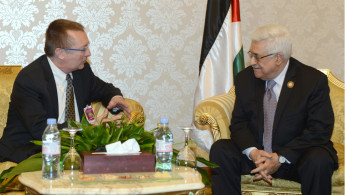UN's Feltman condemns calls to suspend Palestinian-Israeli cooperation
Jeffrey Feltman, the UN's undersecretary-general for political affairs, has criticised Palestinian plans to cancel a security agreement with Israel.
At a press briefing at the UN headquarters on Tuesday, Feltman told reporters he was "deeply disturbed" by PLO recommendations that a security agreement between Tel Aviv and Ramallah be annulled.
"This step constitutes a blatant and suspicious example of unilateral steps taken by one side. It is far from being a step in the right direction for negotiations," he said.
The Palestinian Authority is considering whether to cancel a security coordination agreement after Israeli officials started withholding tax revenues - worth $175 million a month - collected on behalf of Ramallah.
The PA is now in its third month of not receiving tax funds, which has left it unable to pay its thousands of employees - teachers, doctors and police officers.
Palestine's security agreement with Israel has been widely condemned by activists as a tool by Tel Aviv to continue its occupation over the West Bank.
Feltman, a former US diplomat, dodged questions about Israel's continued refusal to acknowledge any boundaries of the future state of Palestine, internationally agreed to be the territories occupied since 1967.
He also refused to respond to Israeli Prime Minister Binyamin Netayahu's recent statement that his government had no intention of withdrawing from the occupied territories.
"The two-state solution is the only solution that seems realistic and workable," Feltman said.
"There is frustration among the Israelis and there is the security question, frustration among the Palestinians and the continued occupation, and the same with the international community because the international efforts in this respect are not making progress."
This article is an edited translation from our Arabic edition.





 Follow the Middle East's top stories in English at The New Arab on Google News
Follow the Middle East's top stories in English at The New Arab on Google News


